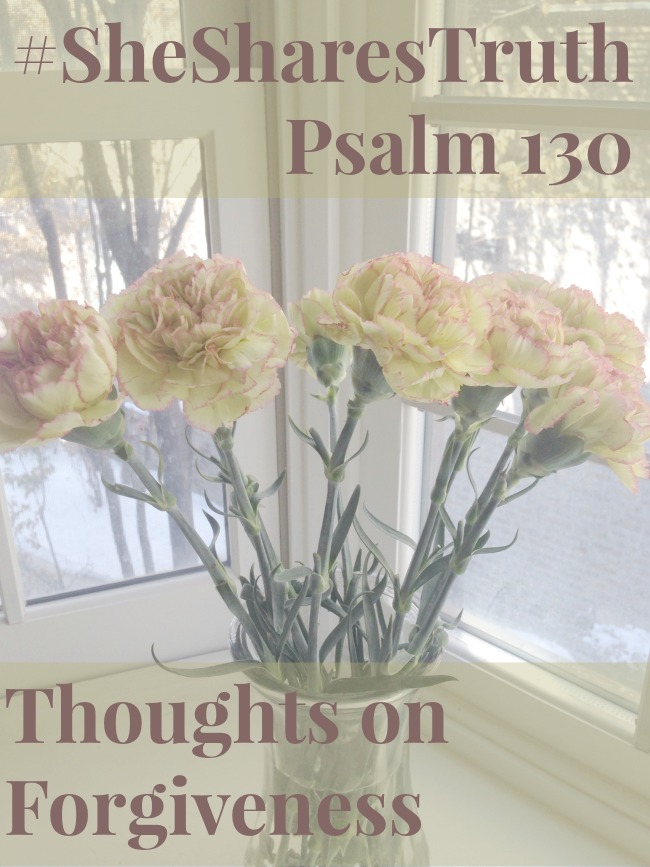
I’m going to warn you right now, this is going to be a deep(ish) post for a Friday.
During Lent I will be following along with #SheReadsTruth in addition to my other devotional (which will lead me through the New Testament in 40 days.) I’m going to spend some serious time in the Word for the next month or so, and I’m excited and energized to strengthen my relationship with God in this way.
(But of course, it’s only Day 3!)
As a part of the #SheReadsTruth challenge, the exercise for this week is to respond to Psalm 130 with my own reflections. Yikes.
Easier said than done.
Especially because this psalm touches on a subject that’s been very much on my heart lately:
Forgiveness.
Gulp.
1 Out of the depths I cry to you, O LORD; 2 O Lord, hear my voice. Let your ears be attentive to my cry for mercy. 3 If you, O LORD, kept a record of sins, O Lord, who could stand? 4 But with you there is forgiveness; therefore you are feared. 5 I wait for the LORD, my soul waits, and in his word I put my hope. 6 My soul waits for the Lord more than watchmen wait for the morning, more than watchmen wait for the morning. 7 O Israel, put your hope in the LORD, for with the LORD is unfailing love and with him is full redemption. 8 He himself will redeem Israel from all their sins. (Psalm 130)
I struggle with the concept of forgiveness. It’s something I’ve been thinking about and praying about a lot over the past few years (I have quite a few difficult relationships in my life and I am quite difficult myself at times!), and I simply have a hard time understanding what true forgiveness looks like, especially biblical forgiveness. You know, the kind that appears over and over again in the Bible. I mean, forgiveness is clearly an important topic!
“Be kind to one another, tenderhearted, forgiving one another, as God in Christ forgave you.” (Ephesians 4:32)
“Bearing with one another and, if one has a complaint against another, forgiving each other; as the Lord has forgiven you, so you also must forgive.” (Colossians 3:13)
“Judge not, and you will not be judged; condemn not, and you will not be condemned; forgive, and you will be forgiven.” (Luke 6:37)
I know to forgive someone on the surface it usually looks like ‘hey, thanks for the apology, we’re cool’, or even simply getting over whatever it was that someone did to me, but what I’m struggling with is what deeper forgiveness looks like.
- Does it mean that everything returns to normal between that person and me?
- Does it mean not dwelling on the wrongs people have done to me? What if the wrongs were really serious?
- What if I can’t get over it? What if I don’t want to?
- Is an apology always necessary if I was the one who hurt someone else? What if years and years have gone by since then and I’m still feeling the guilt?
- If I only really need forgiveness from God, do I still need to ask my fellow brothers and sisters for their forgiveness, too?
- If God has forgiven me for my sins, why do I still feel guilty for them? Shouldn’t God take away those guilty and shameful feelings?
I honestly don’t have the answers to those questions, but it’s definitely something I spend a lot of time thinking about in my own life.
All I can say is, thank goodness that God is more forgiving of me than I am to others or even to myself. Don’t get me wrong, I try to be forgiving. I really, truly do. And I actually (usually) succeed at it without too much effort.
But forgiveness is so difficult to truly practice, right?!
It’s easy for me to say I’ve forgiven someone, but it’s a lot harder to know if I’ve truly forgiven them on the level that I’m called to forgive them on.

For many, many years I thought forgiving someone meant allowing them back in my life in the same capacity as before the individual wronged me. Thankfully, I’ve learned that this may sometimes be appropriate (for example, in marriage), but oftentimes, it’s not. In my 27 (almost 28!) years of life I’ve come to the realization that while everyone deserves to be forgiven, they do not necessarily deserve to be let back in to my ‘inner circle’. I’m definitely capable of forgiving someone in my heart but not going out of my way to foster a relationship with that person.
So what does forgiveness look like then?
Is forgiving someone in my heart enough, or does God ask for more from us?
“For if you forgive others their trespasses, your heavenly Father will also forgive you, but if you do not forgive others their trespasses, neither will your Father forgive your trespasses.” (Matthew 6:14-15)
I find that marriage is the closest example I have to what it looks like to truly forgive someone. In the covenant of marriage we have no choice but to show infinite grace to each other and accept each other unconditionally and keep our relationship together and moving forward – because that’s what the Husband and I promised to do in front of God, our community, and each other. I know what that forgiveness in the context of marriage looks like, and I love it and am so, so thankful for it. When the Husband wrongs me, I have no choice but to fully forgive him and not hold any sort of grudges in my heart towards him, and vice versa. And I’ve discussed before, this grace is my favorite thing about our marriage.
But friendships and family relationships do not have that same power, because there is no covenant that binds me to anyone other than the Husband, nor should there be.
I need to do a lot more thinking on this particular topic, but I’m truly thankful that unlike me (a flawed human being and most definitely a daily sinner), God is able to forgive us and love us completely. Jesus already atoned for my sins far before I even came into existence! How awesome is that?!
What about you, are you an expert at this whole ‘forgiveness’ thing? What does it look like for you?!
Cheers!
















